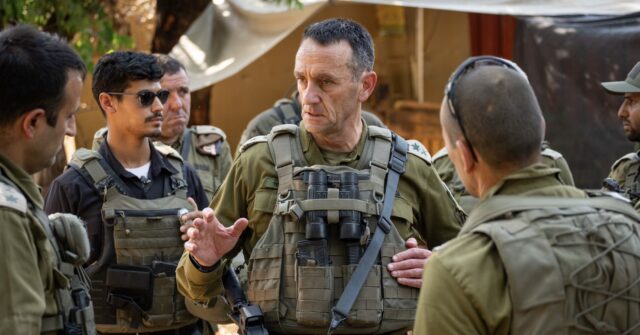
Israel Defense Forces (IDF) Chief of Staff Lieutenant General Herzi Halevi said Tuesday that Israel will not give Hezbollah a break from attack, as Israeli Air Force (IAF) warplanes launched a third wave of attacks in Lebanon.
The post IDF Chief of Staff: We Will Not Give Hezbollah a Break from Attack appeared first on Breitbart.

Israel Defense Forces (IDF) Chief of Staff Lieutenant General Herzi Halevi said Tuesday that Israel will not give Hezbollah a break from attack, as Israeli Air Force (IAF) warplanes launched a third wave of attacks in Lebanon.
The Times of Israel reported Halevi’s remarks: “Hezbollah must not be given a break. [We must] keep working with all our might.” It also reported that the IAF had dropped 2,000 munitions on Hezbollah in the previous 24 hours.
The Israeli offensive, officially named Operation Northern Arrows, appears to have two separate tactics. On the one hand, Israel is carrying out targeted strikes on Hezbollah leaders and officials, including last week’s pager attacks.
On the other hand, Israel is locating and destroying Hezbollah rocket launchers and missile silos, which are often hidden inside civilian buildings or near civilian infrastructure. Israel has told civilians to leave southern Lebanon.
Israel’s defense minister, Yoav Gallant, said Monday: “Over the past day, we have been demolishing what Hezbollah has been building over the past 20 years. Nasrallah remains alone at the top,” referring to the deaths of his deputies.
Hezbollah appears to have been taken by surprise by the strength and accuracy of Israel’s response. Unlike the last war, in 2006, when Hezbollah took the initiative and Israel was not prepared for a long conflict, this time Israel is dictating the pace of the war, even though Hezbollah started it by firing on Israel on October 8 without provocation. For months, Israel would simply respond to Hezbollah fire, but now Israel is pursuing a more aggressive battle plan.
Israel’s goals in the war are to end Hezbollah’s ability to threaten the communities of northern Israel, 74 of which have been evacuated for nearly a year, turning 60,000 local residents, Jewish and Arab, into internal refugees.
As poorly as Israeli intelligence was prepared for the Hamas terror attack on October 7, it has been preparing for possible war against Hezbollah for the past 18 years, given the terror group’s importance to Iran’s regional strategy.
Hezbollah has continued firing rockets at Israel for several days, but Israel’s Iron Dome missile system has managed to keep most of them from landing. Ironically, some rockets have been aimed at Palestinian villages in the West Bank.
Lebanese civilians have heeded Israel’s warnings to leave southern Lebanon, and have clogged roads going north for the last 24 hours, with some drivers running short of fuel, food, and water due to traffic jams that are not clearing.
Israel has also warned residents ahead of attacks by using text messages and telephone calls in an effort to minimize civilian casualties, which Hezbollah has used in the past — successfully — to generate international pressure on Israel.
The IDF is also periodically attacking targets in the capital city of Beirut, where Hezbollah’s remaining leaders are thought to be hiding and meeting. Hezbollah’s communications network was damaged in last week’s pager attacks.
“Israel is not waiting for the threat; we are preempting it,” Israeli government spokesman David Mencer told reporters on Tuesday, adding that Israel intends to change the “balance of forces” on the country’s northern border.
For now, Hezbollah is unwilling to withdraw from the border area, as it is required to do by United Nations Security Council Resolution 1701. Iran may also intervene to help Hezbollah — directly, or through Houthi or Iraqi militias.
However, for the moment, Hezbollah is in a strategic bind: amid steady Israeli attacks, it must either decide to endure the bombardment and degradation of its capacity; or else it must counterattack and risk a larger Israeli response.
Joel B. Pollak is Senior Editor-at-Large at Breitbart News and the host of Breitbart News Sunday on Sirius XM Patriot on Sunday evenings from 7 p.m. to 10 p.m. ET (4 p.m. to 7 p.m. PT). He is the author of The Agenda: What Trump Should Do in His First 100 Days, available for pre-order on Amazon. He is also the author of The Trumpian Virtues: The Lessons and Legacy of Donald Trump’s Presidency, now available on Audible. He is a winner of the 2018 Robert Novak Journalism Alumni Fellowship. Follow him on Twitter at @joelpollak.




